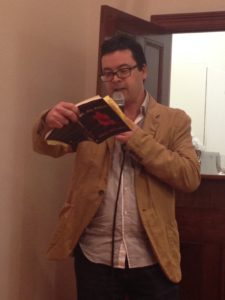
Patrick Allington launched Paul Mitchell’s We. Are. Family. with a terrific speech in Adelaide on Friday 9 September 2016. Several people have asked for the speech, so here it is, in all its glory:
What can I tell you about Paul Mitchell’s We. Are. Family? … What I won’t do is introduce the characters or give you a detailed account of the plot. You should experience those things for yourself. The story unfolds less like a flower opening (despite the arresting cover image) and more like the pulling of sticks, one at a time, from a great pile of wood. And when you read this book, prepare yourself for splinters.
I can tell you that We. Are. Family. spans three generations of men and women, boys and girls. The story of the Stevensons — an ordinary mainstream Aussie family name, isn’t it — unfolds in episodes and with time’s natural order disrupted. Over the decades, the Stevensons live in towns and cities, together and apart (or apart, alone, it often seems, even when they’re living under the same roof). They marry, they separate, they go to school, they bicker, they come together, they procreate, they punch each other (or they punch strangers in pubs), they drift, they die, they cheat, they mythologise, they drink tinnies. The story comes together in a disjoined, disrupted fashion — that’s a compliment, not a complaint — and the gaps in the story are themselves ripe with meaning.
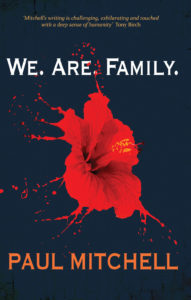
I can tell you that the three G’s — God, George Orwell, and Gary Ablett Snr — inhabit the pages of We. Are. Family. Footy is everywhere in this story — from country grudge matches to the topline Melbourne stuff. On the one hand, to many readers, including me, as well as to many of the book’s characters, AFL is familiar, comforting, central to the universe. But on the other hand, it elevates a certain sort of male bonding, a certain type of team-first ethos, and, especially, a certain sort of ritualised violence. All this is real, acceptable, celebrated, symbolic … in other words, the mass allegiance to AFL has its messy and excluding elements. As for God and George Orwell — and UFOs, for that matter — they can be whatever their believers want them to be.
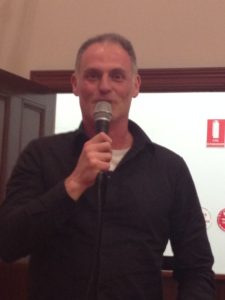
I can tell you that the mood of We. Are. Family. is that of a thunderstorm permanently about to break. And that as you read, tentacles of dysfunction will twist around your wrist. We. Are. Family. gazes unblinkingly — but compassionately — at a certain sort of Aussie bloke: his attitude to life, his behaviour towards women, his capacity for violence (so casual, so embedded, so deceptively innocent or even childlike (or so we manage to believe), so seemingly natural, like the tides). You may react differently when you read it, but to me, We. Are. Family speaks in an unadorned and eloquent way about mainstream Australia, not least our remarkable ability — an almost literally fantastic ability —to avert our collective gaze. By coincidence, the book I read before We. Are. Family. was Charlotte Wood’s novel about misogyny, The Natural Way of Things. These two novels are very different in tone and approach, but they speak to each other, I think. As with The Natural Way of Things, We. Are. Family will bounce off the walls of your mind, demanding a response, demanding engagement, demanding, I think, something more than merely reading and basking in the warm inner glow of feeling ‘informed’.
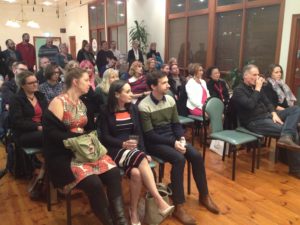
I can tell you that despite its raw tone and its challenging themes, We. Are. Family. is a funny book — it doesn’t set out to be comic, but it is devastatingly wry. The humour can be searing — because it’s honest — and yet somehow hopeful and open. This is a world in which everything stops for an AC/DC concert:
‘It wasn’t as if AC/DC needed him to be presentable. But, shit, it was a big occasion for him. Kind of like a wedding. Bigger, really, but he’d never tell Kerryn that. For obvious reasons.’
Shortly after this moment, the story gets very serious indeed — a good example of the novel’s deliberately jarring momentum.
All of what I’ve told you so far reflects my experience of reading We. Are. Family. But none of it — even if I lump all these points together — fully captures what I most liked about this novel, which is the potency of its details, such as,
‘Soon the sky turned rough charcoal like the barbecue when Ron forgot to clean it.’
or
‘He shouldn’t have bothered having a go at fried rice because he never knew how much soy sauce and how many peas.’
or
‘Your father is under a lot of pressure,’ his mum says, and Peter wonders, if UFOs exist, can they see in windows?
[74]
We. Are. Family reverberates with details, with specifics.
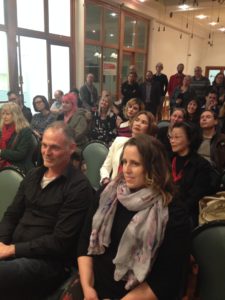
A word about MidnightSun. Independent publishing is a hard slog, and so often a thankless task. But if we want the national conversation to actually be a national conversation, we need small independent publishers at least as much as — probably more than — we need Penguin Random House. We need different gatekeepers with different models and priorities. Not least, we need different ideas about what constitutes (that dirty word) ‘excellence’. And we need publishers — more than a few — who do not operate out of, and think differently to, Sydney or Melbourne (much as, of course, we love Sydney and Melbourne people). Diversity doesn’t happen by us waving our arms about and hoping for the best. So I thank MidnightSun for fighting the good fight.
And I thank MidnightSun for publishing this book … We. Are. Family is a novel that has a great deal to say about Australia, not all of it pleasant, but it is not a novel that preaches or condemns. The characters are often in conflict, with themselves or with others. They sometimes seem to crave peace, but just as often they seem to go out of their way to scupper peace. The Sister Sledge song ‘We are family’ has become a celebrated anthem for solidarity. The novel We. Are. Family offers an ambiguous, tense, fractured solidarity … but still a solidarity of sorts. I commend it to you. Buy it, read it, think about it, talk back to it.
Patrick Allington
